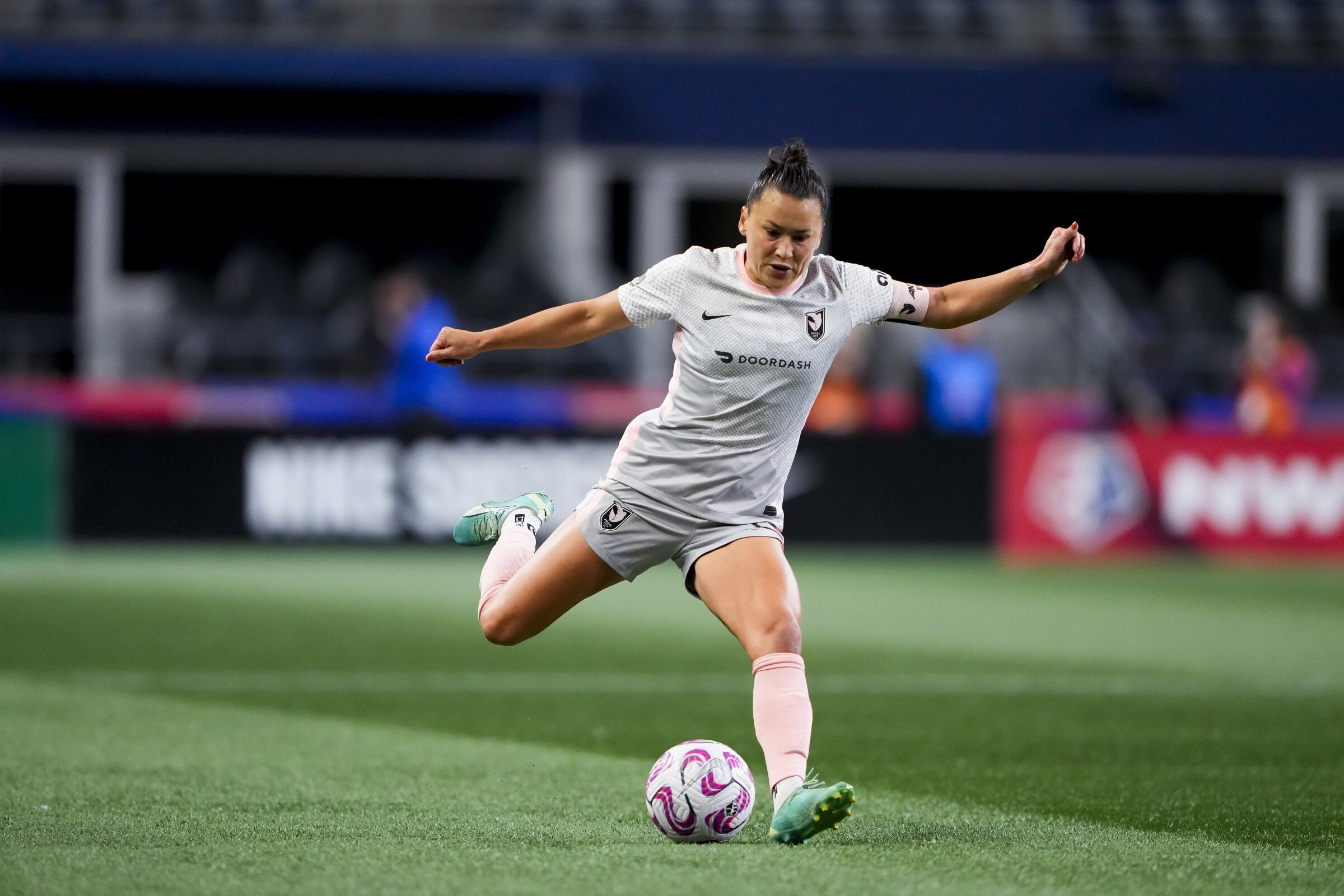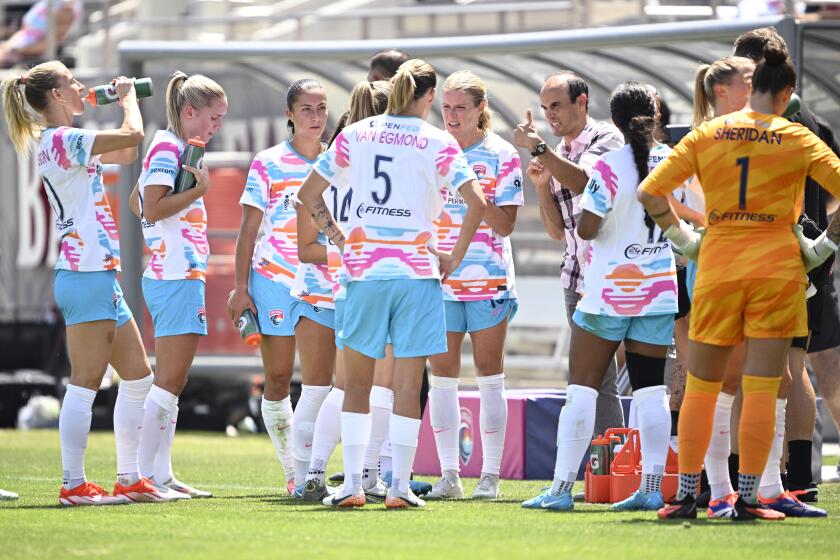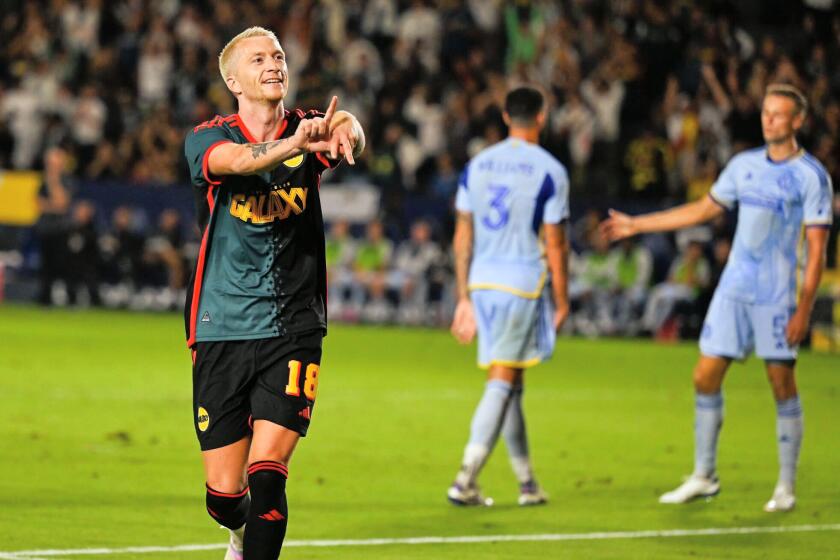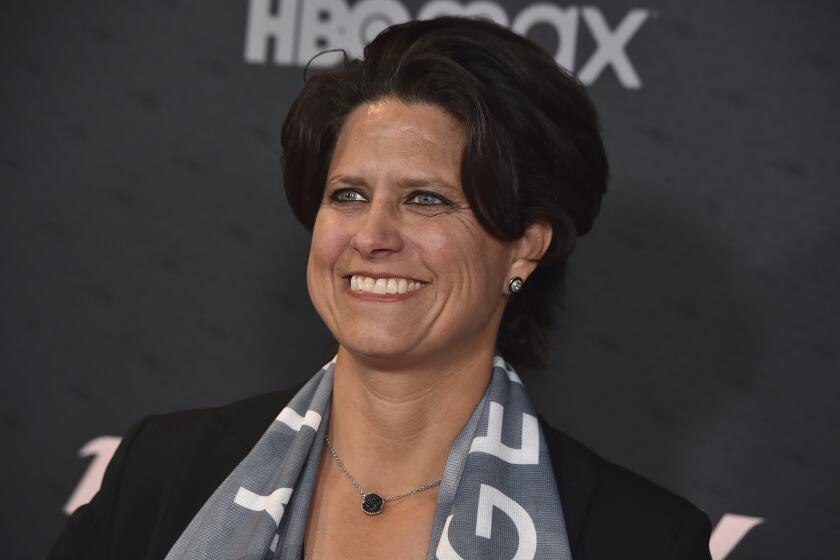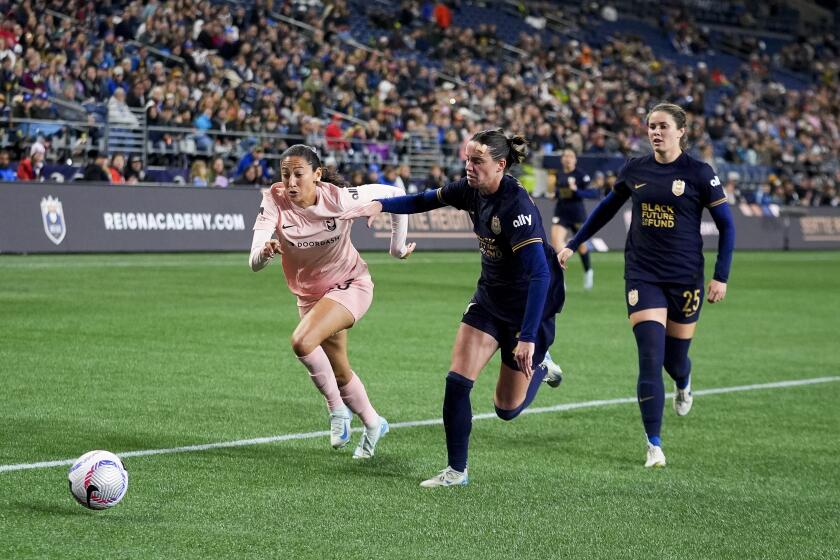Kevin Baxter writes about soccer and hockey for the Los Angeles Times. He has covered seven World Cups, four Olympic Games, six World Series and a Super Bowl and has contributed to three Pulitzer Prize-winning series at The Times and Miami Herald. An essay he wrote in fifth grade was voted best in the class. He has a cool dog.
1
There’s a line every athlete approaches late in their career. It’s a finish line of sorts, one that separates their prime years from their borrowed-time years.
For some, the line is obvious; as bright and unmistakable as the neon signs lighting the Las Vegas Strip. For others, it’s thin and all but imperceptible. But either way, the challenge is to cross the finish line of your career having given everything you can to your sport while retaining enough of your health, vigor and sanity to enjoy the post-playing days.
Ali Riley fears she is approaching that line. A persistent nerve issue in her left leg, the first major injury of her 15-year career, landed her on Angel City FC’s season-ending injury list 12 days ago. It also kept her out of what would have been her fifth Olympics with New Zealand this summer and limited her to five games and 260 minutes this NWSL season.
Landon Donovan, the best player in USMNT history, is embracing a somewhat unorthodox approach in his new role as San Diego Wave interim coach.
Riley will turn 37 the day before Halloween, old for a soccer player but young for just about everybody else. The end is nigh, she knows, but it’s not here yet. So she waits, does hours of mind-numbing rehab in a gym each day and readies for what crossing that the line will mean.
“I will keep trying until the doctor says it is so bad for your health or so bad for your daily life that you should not keep coming back,” she said. “I’m glass half full, I’m a rose-colored glasses [person]. I’m the most positive, optimistic person around. But I still have to be smart.
“I have to be prepared for my future and a life after soccer.”
It’s taken Riley a while to get there. At first she was angry and frustrated with coaches and doctors who wouldn’t let her play. Days after being unexpectedly dropped from the New Zealand Olympic team in France, she cried her way through an appearance at Angel City’s women’s equity summit in Paris.
“In those dark, dark moments when I couldn’t walk, I couldn’t run, I [didn’t] know if I’ll ever be able to play soccer again,” she said later.
That doubt has since been replaced by acceptance.
“When you get to this point,” she said, “your perspective has shifted so much.”
If Riley never appears in another game, she’ll retire as one of the most influential and respected players in women’s soccer history. (For what it’s worth, she’s one of the nicest too.)
A five-time World Cup performer and four-time Olympian, captain of the New Zealand national team for a record 50 games — including the country’s only World Cup victory. She won 11 trophies while playing for eight clubs in five countries and was instrumental in a campaign to get women private hotel rooms, charter flights and base camps during the last World Cup — perks the men have had for years.
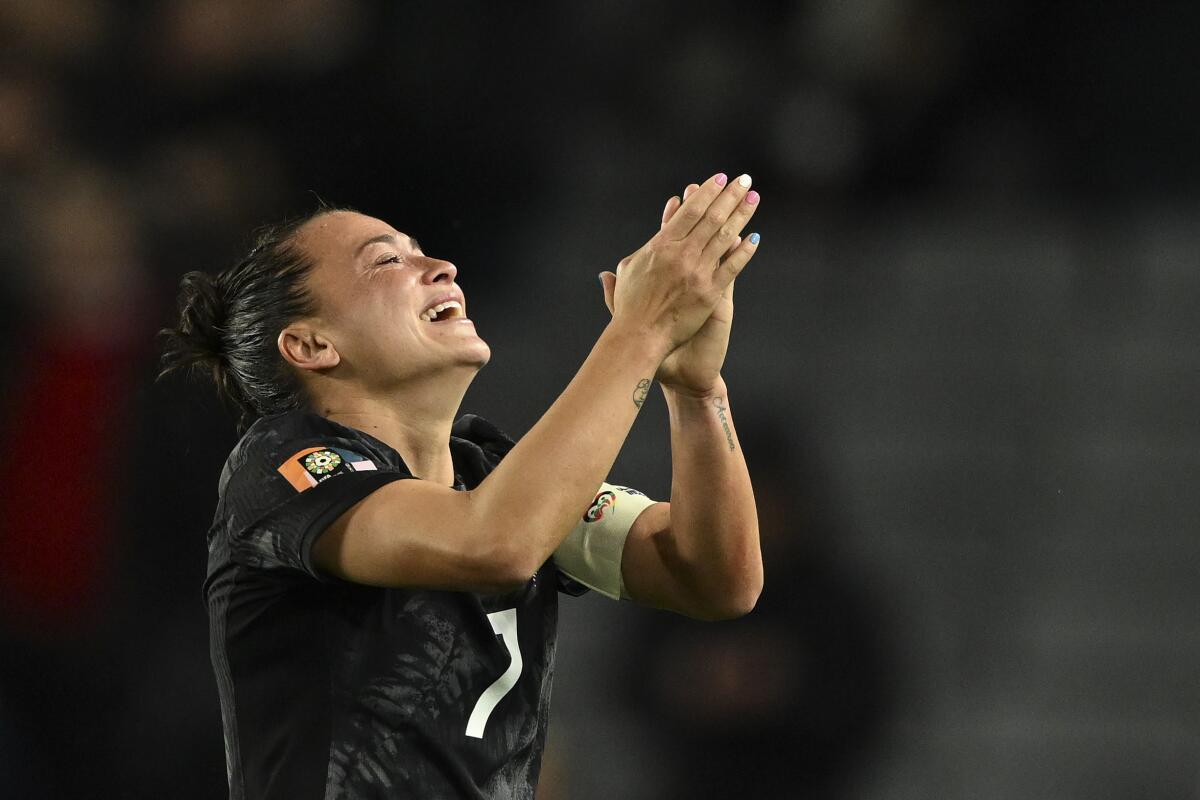
Ali Riley celebrates as a member of New Zealand as it beat Norway for its only Women’s World Cup win ever, last year in Auckland.
(Andrew Cornaga / Associated Press)
“Whatever life brings me. I’m prepared and I will take it on with a smile, hiking up all the people around me. Because that’s what I love to do.”
— Ali Riley
“You never want to see a player go on SEI, especially someone who makes as much of an impact on and off the field as Ali,” Angel City coach Becki Tweed said. “When you’re a professional athlete you want to play every minute of every day, and when you can’t, it is devastating.
“It can’t be overstated how much Ali means to this team and community, and we are with her every step of the way.”
A Harvard-Westlake grad, Riley returned to help launch a women’s professional team in her hometown in 2022. She’s a certified health coach who last year published a cookbook. She has a Stanford education and she’s had brands deals with ESPN, Nike, Puma and a clothing brand in Sweden, where she once played. She hosted a series on YouTube, gave a talk for Anheuser-Busch, partnered with a sports nutrition company and in March became engaged (finally!) to longtime boyfriend Lucas Warrer Nilsson.
She is one of those rare people who can brighten both a locker room and a conference room simply by entering it. And there would appear to be few mountains — inside or outside the sport — left for her to climb.
So while she may be approaching the end of one career, she is preparing to cross the threshold into another.
“My cup is so full,” she said. “Coming to Angel City, I have my family, I have support, but also I have these other passions, these side hustles. I’m so proud of myself for putting energy into other things that make me happy and taking the time to learn what makes me happy.
“I can speak, and speak publicly, about things that are important to me. That has set me up for this really tough time.”
It’s a tough time not simply because she can’t play soccer, but also because the decision is no longer hers to make. Riley has another year left on her contract and wants to play, wants to help Angel City back to the playoffs. Whether that will happen is up to her body, and after consulting with specialists in two countries, she’s still unclear what she needs to do to convince her body to let her play.
She isn’t even sure how she got the injury, although she suspects it happened last November when she landed awkwardly during a training session on a poor field in Colombia.
Marco Reus scores late in his first game with the Galaxy during a 2-0 win over Atlanta that gave L.A. an unprecedented 400th MLS victory.
“Hearing what some of my colleagues in other countries have experienced when they have had soccer taken away from them, I felt a little bit sheepish after being so upset about my nerve injury,” Riley said. “It still sucks to be injured. It sucks not to be able to play; to watch my team every day is hard. I’m super motivated to come back.
“But,” she added, “there are no guarantees in life, especially not in professional sports.”
For Riley, the finish line she is approaching is neither cloaked in neon nor so thin as to be imperceptible. But it is unavoidable and she vows not to trip when she crosses it.
“I want to run the L.A. Marathon. I want to be able to surf. If we have children, I want to be able to pick them up and run after them,” she said. “So that’s No. 1. I don’t want to threaten that.”
“Whatever life brings me, I’m prepared and I will take it on with a smile, hiking up all the people around me. Because that’s what I love to do.”
⚽ You have read the latest installment of On Soccer with Kevin Baxter. The weekly column takes you behind the scenes and shines a spotlight on unique stories. Listen to Baxter on this week’s episode of the “Corner of the Galaxy” podcast.
